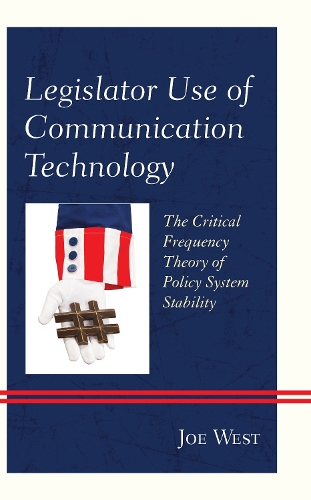
Legislator Use of Communication Technology: The Critical Frequency Theory of Policy System Stability
(Hardback)
Publishing Details
Legislator Use of Communication Technology: The Critical Frequency Theory of Policy System Stability
By (Author) Joe West
Bloomsbury Publishing PLC
Lexington Books
3rd December 2018
United States
Classifications
Professional and Scholarly
Non Fiction
Communications engineering / telecommunications
328.73
Physical Properties
Hardback
278
Width 157mm, Height 239mm, Spine 23mm
581g
Description
Political use of communication technology is rapidly changing the nature of politics; one need look no further than President Trumps use of Twitter to realize the impact that communication technology is having on political processes. Communication technology has long been recognized as part of the policy feedback process, but until now, has received relatively little focus, often relegated to a line or two in a policy process theory system diagram labeled feedback." This book takes a fresh look at the role that communication technology plays in the policy process by applying natural science control and electrical engineering concepts such as bandwidth, latency, phase crossover, and positive and negative feedback to develop the critical frequency theory of policy system stability. This theory suggests that every policymaking institution has some critical frequency of communications from the policy environment that once exceeded, causes the policymaking institution to go unstable, and it is this instability that causes the policymaking process to speed up. With the theory developed, data collected on approximately 2,000 state legislators from every state in the U.S. is analyzed using linear and nonlinear regression models to understand the statistically significant relationships between communication technology frequency of use and importance, and the demographic, political, and institutional variables that contribute to policy process stability and instability. Additionally, interviews with legislators uncover many novel and interesting examples of the use of communication technology in the policy process. For example, legislators note that lobbyists sitting in legislative chambers listening to floor debates are actually texting questions and answers to legislators as they debate; legislators participating in this process are acting as policymaking puppets for the lobbyists sitting in the gallery. This single use of a communication technology has the capability of changing the very nature of what it means to be a legislator; with lobbyists acting as surrogate legislators.
Reviews
This book offers the most complete explanation of a policy feedback loop so far in public policy literature. Students and established scholars alike will learn important insights into concepts they have used or seen but perhaps not fully understood, such as negative and positive feedback loops, disturbances, and policy systems theory. The concepts are explained with an engineers precision and then applied to a new database on state legislative communications strategies, supplemented with extensive interviews with legislators and their staffs. As new communications technologies continue to alter the landscape of politics, this book provides important information about how legislators communicate with their constituents, lobbyists, each other, and why this matters. -- Frank R. Baumgartner, University of North Carolina at Chapel Hill
Author Bio
Joe West is assistant professor at the University of North Carolina at Pembroke.
